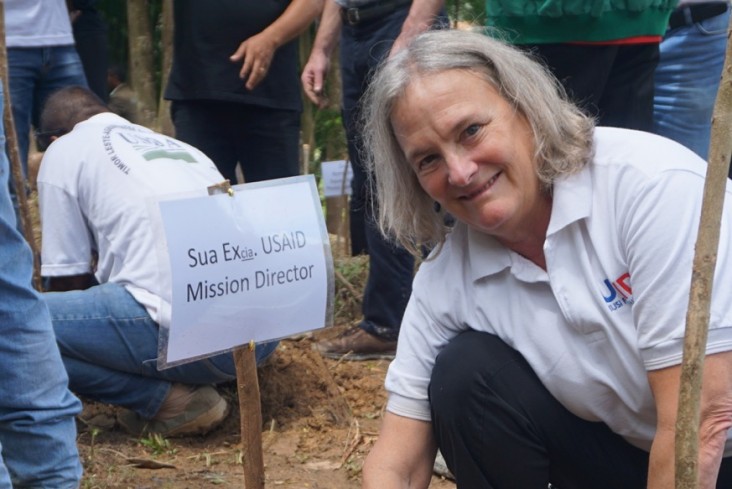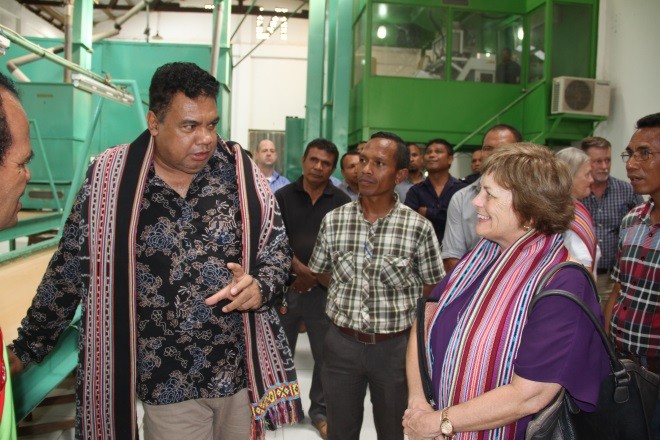Speeches Shim
By James Reindl / USAID
It would have been difficult to tell during the days of Indonesian rule in Timor-Leste that someday the coffee sector might be a great example of how an enterprise – or a country – can move along its journey to self-reliance. But on March 19, Timor-Leste and the United States marked an important milestone after 20-plus years as the last U.S. coffee support project ended.
U.S. representatives marked the end of the U.S. Department of Agriculture’s Agribusiness Development Project, which supported Cooperativa Café Timor and the National Cooperative Business Association. U. S. Ambassador Kathleen M. Fitzpatrick and USAID Mission Director Diana B. Putman joined CCT and USDA staff from Jakarta and Washington for ceremonies, which included visits by some to two farms in Aileu Municipality growing coffee, cloves, vanilla and black pepper. The dignitaries planted vanilla and clove seedlings while out in the field.
USAID launched the coffee sector, now Timor-Leste’s second largest export behind oil, more than 20 years ago by convincing the Indonesian government to loosen controls over Timor-Leste’s tiny coffee industry. Since then, USAID and then USDA have invested more than $50 million to develop the industry.

“This was a historic day for U.S. Government assistance to Timor-Leste,” said USAID Mission Director Diana B. Putman. “USAID is proud to have revived the coffee industry and pleased that USDA has expanded this work by introducing new spices to further increase rural farm incomes.”
USDA’s program launched in 2013 and introduced high-value spices. Exports hit an all-time high last year at 32 tons, NCBA recently reported. Much of the spice crop, which includes cloves, vanilla and pepper, goes to McCormick & Company in the United States.
Meanwhile, the demand for Timor Fair Trade certified coffee from U.S.-based Starbucks, one of CCT’s main customers, exceeds the supply, said Sam Filiaci of NCBA. Further farm rehabilitation efforts to clear thick forest, provide adequate sunlight and properly prune coffee trees will increase production in the future.
The USDA project provided seedlings and training to farmers in the production of cloves, vanilla, cocoa, pepper, coffee, moringa, and cassava in the Timor-Leste municipalities of Aileu, Baucau, Lautem, and Viqueque. Dutch brewer Heineken, which has a brewery in Timor-Leste, recently launched a cassava-based beer with CCT cassava.
At the time the Suharto government loosened its grip on Timor coffee, NCBA started with USAID assistance to organize 450 coffee farmers into the cooperative that in 2000 became CCT with more than 20,000 farmers. Now, CCT not only exports coffee and spices but it runs a string of health clinics in the capital Dili and other municipalities, providing services to more than 100,000 people.
"Through U.S. assistance CCT has shown how an enterprise -- or a country -- moves toward self-reliance. The urgent need for agricultural development provided the commitment and U.S. assistance helped develop the capacity so ably demonstrated through the years by CCT’s continued progress,” Dr. Putman said."

Ambassador Fitzpatrick told the audience at CCT, which included the Minister of Agriculture, that the United States is proud of its support and also proud to know that Timor-Leste coffee and spices are on American breakfast and dinner tables.
Agriculture Minister Dos Reis Martins thanked the American people for supporting the Timorese people through USAID and USDA.
Ambassador Fitzpatrick also noted that the United States has invested about $125 million in agriculture development overall in Timor-Leste since the launch of coffee. The U.S. government is still heavily invested via the Avansa Agrikultra Project, Increasing Resilience in Oecusse activity, the Farmer-To-Farmer Program and the McGovern-Dole School Feeding Program.

Comment
Make a general inquiry or suggest an improvement.